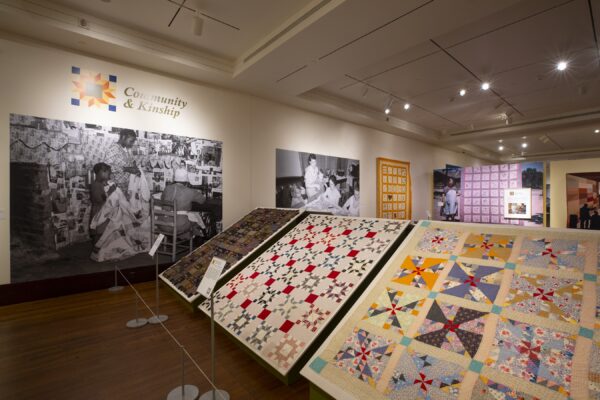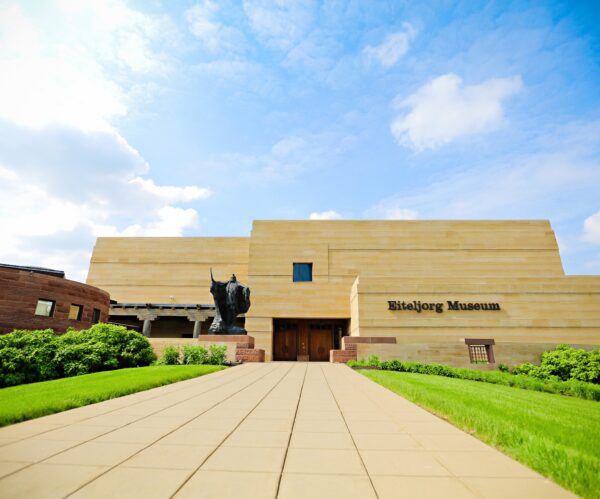
- Details
- By Native News Online Staff
INDIANAPOLIS – For more than 30 years, the Eiteljorg Museum of American Indians and Western Arthas championed the understanding of the art, history and cultures of the Indigenous peoples of North America and of the American West through its eclectic, storytelling exhibits. But since March 17, following the COVID-19 outbreak, that mission was somewhat halted — but not entirely.
During the closure, museum staff launched an enhanced website featuring interactive content about exhibits and programs, including curator videos and educational activities. Three months into the pandemic, its doors will soon reopen for in-person business. The first day back is Saturday, June 20, but it's only open to members through June 26, as its “members appreciation week.” Then, on June 27, the Eiteljorg opens to the general public with regular admission. Advance tickets are available here. The downtown Indianapolis museum, located within White River State Park, has extended its primary exhibitions interrupted by the pandemic, allowing visitors a chance to catch up on what they missed during the shutdown, according to Eiteljorg Museum President and CEO John Vanausdall. “We greatly appreciate the understanding of our members and supporters during the temporary closure, and are grateful for the way they embraced our interactive online website,” Vanausdall said in a statement. “Now we are looking forward to welcoming back our visitors in person.”
“The Eiteljorg is a calming, open and clean space,” Vanausdall added. “Once people can make plans to visit cultural attractions again, we hope they will visit the Eiteljorg Museum first – and when here, experience the exhibit Quilts: Uncovering Women’s Stories first.” Along with the Quilts exhibit, the other two extended exhibitions include Please Touch: The Sculptures of Michael Naranjo and For A Love of His People: The Photography of Horace Poolaw.
 Front exterior of the Eiteljorg Museum (Image courtesy Jessica Strickland Photography, 2013)
Front exterior of the Eiteljorg Museum (Image courtesy Jessica Strickland Photography, 2013)
Visitors are encouraged to order their tickets in advance at eiteljorg.org to reduce in-person purchases. Assisting the museum with other aspects of the reopen process is Dr. Richard Feldman, M.D., an Eiteljorg Board member, family physician and former Indiana State Health Commissioner. “In reviewing the institution’s reopening plan, I am very pleased with its detailed, thorough and thoughtful design based on the best available public health advice from national and state experts,” said Dr. Feldman in a statement. “I believe visitors to the museum will find the very safest environment possible. This is dependent in part, of course, on the visiting public being mindful of protocols put in place and exercising appropriate hand sanitation, mask-wearing and social distancing.”
Upon entering the building, which is located at Central Canal at 500 West Washington St., guests are required to wear face masks and will receive a non-invasive temperature check. Guests must also follow the blue “permission lines” marked on the floor to maintain social distancing around exhibits and follow other directions of museum staff. Beyond that, hand sanitizing stations are located around the building and seating capacity is reduced in the Museum Café so that customer tables can be spaced at appropriate distances. Recent state and city government orders now allow the Eiteljorg and other Indiana museums to reopen at 50 percent capacity to visitors.
More Stories Like This
Native News Weekly (August 25, 2024): D.C. BriefsNavajo Nation Mourns the Passing of Former Vice President Rex Lee Jim
Deb Haaland Earns Endorsement From Communications Workers of America Local 7076
University Soccer Standout Leads by Example
Two Native Americans Named to Democratic Congressional Campaign Committee's“Red to Blue” Program
Help us defend tribal sovereignty.
At Native News Online, our mission is rooted in telling the stories that strengthen sovereignty and uplift Indigenous voices — not just at year’s end, but every single day.
Because of your generosity last year, we were able to keep our reporters on the ground in tribal communities, at national gatherings and in the halls of Congress — covering the issues that matter most to Indian Country: sovereignty, culture, education, health and economic opportunity.
That support sustained us through a tough year in 2025. Now, as we look to the year ahead, we need your help right now to ensure warrior journalism remains strong — reporting that defends tribal sovereignty, amplifies Native truth, and holds power accountable.
 The stakes couldn't be higher. Your support keeps Native voices heard, Native stories told and Native sovereignty defended.
The stakes couldn't be higher. Your support keeps Native voices heard, Native stories told and Native sovereignty defended.
Stand with Warrior Journalism today.
Levi Rickert (Potawatomi), Editor & Publisher

